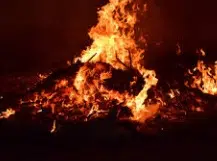Latin is where we can establish the origin of the term bonfire that concerns us now. Specifically, it derives from the word "focaria" which, in turn, emanates from the noun "focus", which can be translated as "home" or even as "fire."
It is considered that the first time the term bonfire was used as such was in the 13th century.
The concept of bonfire is used to name a fire that is voluntarily lit outdoors for some purpose. Terms such as pyre , hearth and campfire can be used synonymously.
 To light a bonfire, fuel elements capable of producing a lot of flame must be used. One of the most used fuels to create a bonfire is firewood .
To light a bonfire, fuel elements capable of producing a lot of flame must be used. One of the most used fuels to create a bonfire is firewood .
Bonfires can be lit for multiple purposes. When camping , many people use a bonfire to warm themselves and to obtain light at night. In these cases, it is important to keep in mind that, depending on the geographical area, the bonfire can trigger a forest fire : that is why it should only be lit in a place designated for this purpose.
In several regions, bonfires are part of popular celebrations and rituals . In the Festival of San Juan that is celebrated on June 23 in several European countries, for example, bonfires are lit to give strength to the sun and for those attending to purify themselves.
In ancient times, on the other hand, the stake was a method of execution of great cruelty, since the condemned person was burned alive and suffered terrible pain before dying. The bonfire was usually chosen when the condemnation had a religious reason, due to the link established between fire and purification .
In some cases, the convicted person did not die from contact with the fire, but from the smoke that he inhaled and caused poisoning . Therefore death came before direct contact with the bonfire.
The Inquisition , a court of the Catholic Church that was responsible for condemning heresy , often resorted to burning at the stake. Joan of Arc , to cite one case, died at the stake in 1431 .
In the same way, we cannot ignore the fact that one of the classics of literature has in its title the word that concerns us now. We are referring to the novel "The Bonfire of the Vanities", which was published in 1987 and was written by the American author Tom Wolfe.
A wealthy stockbroker is the protagonist of this story in which the reality of New York society in the 1980s is shown. Specifically, it reveals how the city's rich people like that one live, everything what they are capable of doing to maintain their social status or the set of circumstances that surround that group of people who have money and power.
At a historical level we have to establish that the bonfire of the vanities is an event that took place on February 7, 1497 when in Florence (Italy) a group of people, led by the monk Girolamo Savonarola, publicly burned a multitude of objects during on Carnival Tuesday. Objects that were considered lascivious, sinful or that incited vanity.
